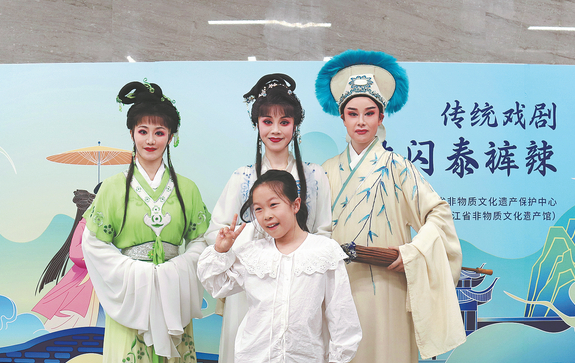On the afternoon of Nov 10, as the curtain fell on a professional Kunqu Opera performance at the Traditional Theater Hall on the third floor of the Zhejiang Intangible Cultural Museum in Hangzhou, Zhejiang province, several novice performers, dressed in theatrical costumes, stepped onto the stage and started their show.
It was their first time, learning and taking part in traditional opera.
Even though their posture was not entirely natural and their singing was not polished and melodious, the enthusiasm of both the participants on stage and the audience was undiminished.
Everyone involved was visibly joyful and deeply immersed in the experience.
As the curtain fell on the amateur performance, the museum concluded its final offline event as part of its "traditional opera experience" and "study activity" series.
Launched on Nov 3, the series comprised five distinct thematic events, each highlighting the rich and diverse theatrical heritage of the province, including Yueju Opera, Kunqu Opera, and Shaoju Opera.
These events, capitalizing on the vast resources of the museum, offered participants an immersive experience in the world of traditional opera. Attendees had the unique opportunity to engage with various aspects of opera culture, including theatrical makeup, stage movements, and singing techniques.
This hands-on approach allowed participants to deeply appreciate the nuances and beauty of Zhejiang's traditional operatic culture, thus providing a comprehensive and engaging introduction to the rich tapestry of regional performance arts.
The activities were diverse, including puppetry and shadow play experiences, opera-themed lectures, performances, hands-on workshops, guided tours, makeup and singing technique tutorials, and interactive presentations.
The event also extended its reach through livestreams hosted by multiple video platforms, cumulatively attracting 3.93 million views.
As the first activity to debut, a puppet show and a classic, authentic Yueju Opera performance of The Legend of the White Snake — Boating on the Lake were performed in a subway station and were greeted by enthusiastic applause and approval from passengers.
The next event was held inside the museum, where audiences had the opportunity to delve into the world of traditional opera. They could explore a variety of theatrical elements, such as jewelry, facial makeup, helmets and costumes from Yueju Opera, Shaoju Opera and Wuju Opera. Additionally, a traditional opera stage was set up, along with three independent audiovisual rooms for appreciating the artform.
Visitors could also immerse themselves in the construction process of a traditional opera stage through a digital mini-cinema. The detailed explanations provided by the guides enriched visitors' understanding and appreciation of opera.
People were also invited to learn about puppet shows and Chinese shadow puppetry. The event uniquely combined exhibits displayed with dynamic, interactive experiences.
Puppet heads and intricate shadow play figures were on display. Visitors could also try their hand on manipulating marionettes and performing shadow plays.
This innovative combination of viewing and hands-on creation provided a unique experience. Craftsmen and teachers were on site to instruct visitors on how to recognize and operate shadow play figures, as well as how to provide them with fitting voiceovers.
This approach allowed participants to engage both with the static displays and the hands-on activities, enhancing their understanding and appreciation of the respective art forms.
The offline activities also featured lectures by theatrical professionals, as well as appreciation sessions for classic films. A highlight of the session was a special lecture on traditional comic opera by Tang Jun'er, a renowned national first-class actress. During the event, Tang elucidated the roles and characters in comic opera, interspersed with analysis of classic scenes, which kept the audience in a constant state of laughter. Following the lecture, the participants visited the digital mini-cinema for intangible cultural heritage to watch a classic comic opera film.
The "close encounter with traditional opera" event welcomed a group of children who enthusiastically engaged in various activities.
The young attendees took photos wearing traditional opera headpieces, watched plays on the traditional opera stage, and interacted with Kunqu Opera performers.
Additionally, three participants were selected to dress up as characters from an opera. These lucky visitors, once in costume, learned singing techniques and movements under the guidance of Kunqu performers, transforming their theoretical knowledge into practical experience and deepening their understanding of traditional opera.

